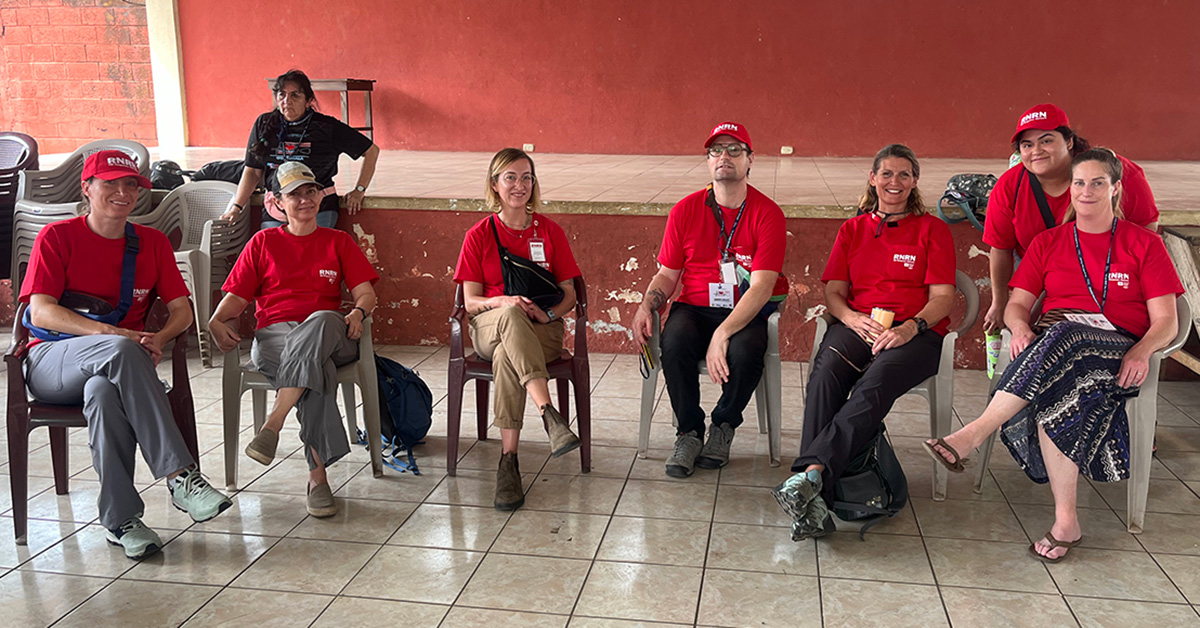Nurse volunteers staffed free health clinics in Guatemala

Registered Nurse Response Network RNs treated more than 2,000 people
By Chuleenan Svetvilas
National Nurse magazine - April | May | June 2024 Issue
A team of volunteer registered nurses returned on April 24 from Guatemala, where they provided free medical care in rural, severely underserved areas as part of Registered Nurse Response Network (RNRN), a disaster-relief project of National Nurses United and the California Nurses Foundation.
RNRN partnered on this humanitarian mission with the Organizacion Amancio Samuel Villatoro (OASV), a group that serves vulnerable people in Guatemala by preserving historical memories and organizing medical missions. RNRN had previously worked with the earlier incarnation of OASV, Fundacion Amancio Samuel Villatoro (FASV), most recently in 2019, sending teams of nurses in the spring and winter.
Eight nurses from California, Colorado, Illinois, and Minnesota traveled on April 16 to the Solola region of Guatemala, where they staffed health clinics for people in rural areas who have little or no access to drinking water, basic medical care, dental care, or medications. The RNRN volunteers, along with volunteer doctors and dentists, treated more than 2,000 people at the pop-up clinics. Patients lined up for hours, waiting for basic health checkups, teeth extractions, and optometry care.
“Some of the people that we saw walked for hours without shoes to come to the clinic,” said Venessa Soldo-Jones, RN in the emergency department at Mercy Hospital in Coon Rapids, Minn. “We took vital signs, checked glucose levels, and provided very basic, very rudimentary care. It was all about the human interaction, empathy, and touch — the human care that we’ve lost in our advanced medical systems. We talked with them about their lives and problems. It was not about tests, labs, treatments, imaging, or the ‘care’ that drives the corporate machines in the United States.”
“Patients were dehydrated or have parasites because they don’t have access to clean drinking water,” said Patricia Guerrero Huertas, RN in the infusion center at Kaiser Permanente San Francisco Medical Center. “But they are also being inundated with sodas because the sodas are being promoted by soft drink companies. The result is people are now having diabetes, kidney issues, cavities, and other preventable diseases.”
The volunteer nurses said that the experience was very fulfilling and eye-opening. Soldo-Jones noted that the ongoing disparities and lack of resources for health care was “mind-blowing.” For most patients they saw, there were no hospitals in their area, which means there is no emergency room available for care.
“It was very soul-filling work,” said Soldo-Jones, who has also volunteered on six other RNRN disaster relief deployments, including Hurricane Maria in Puerto Rico, Hurricanes Ian and Michael in Florida, and Hurricane Dorian in Grand Bahama Island. “You really feel like you’re helping.”
“The experience really charged my nursing batteries,” said Guerrero Huertas, who has previously volunteered for the RNRN deployment to Grand Bahama Island in the wake of Hurricane Dorian in 2019. “Part of our mission as nurses is to care for communities and provide care. We achieved that goal.”
RNRN gratefully accepts donations to its work. To contribute or to sign up as an RN volunteer, please visit www.nationalnursesunited.org/rnrn.
Chuleenan Svetvilas is a communications specialist at National Nurses United.